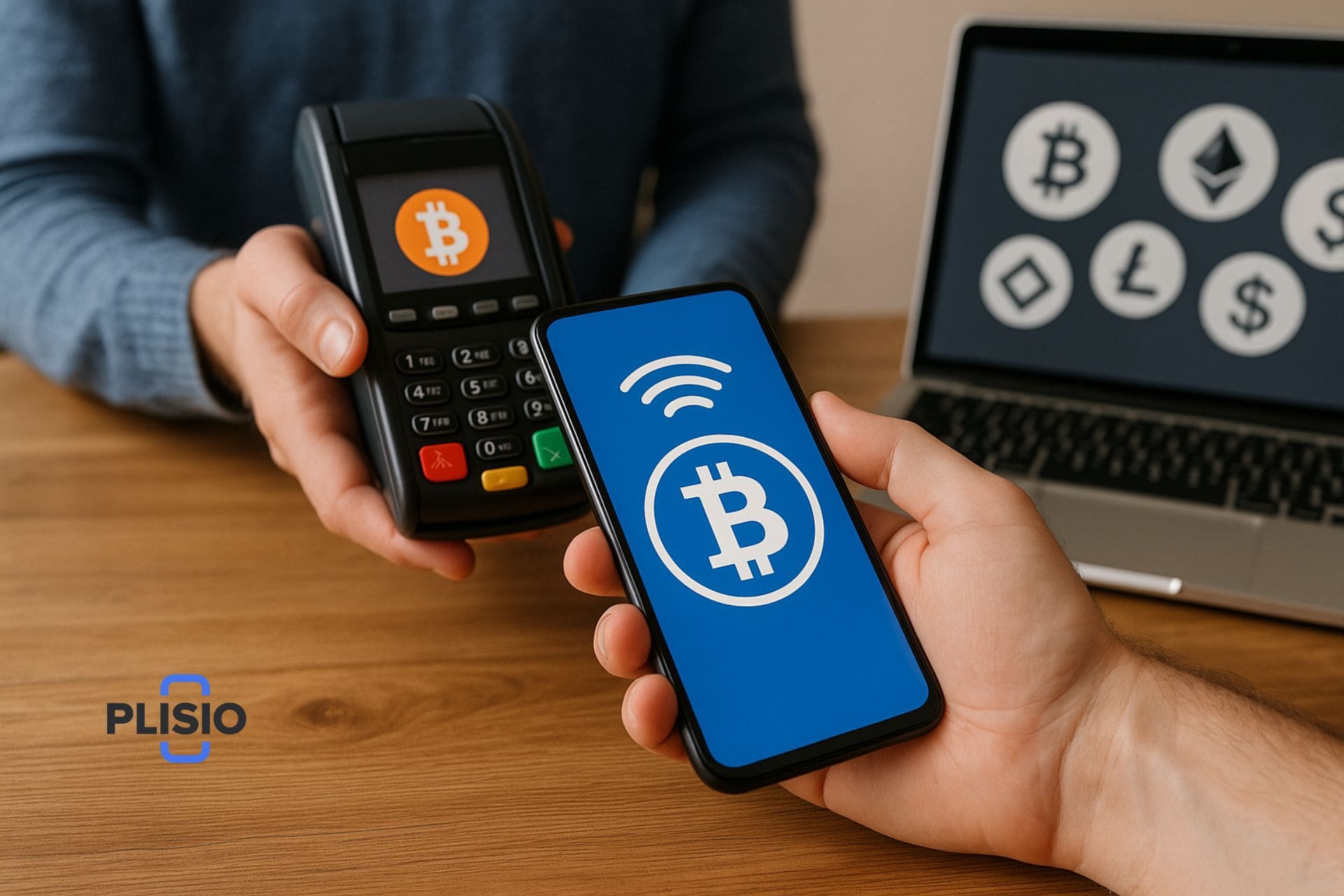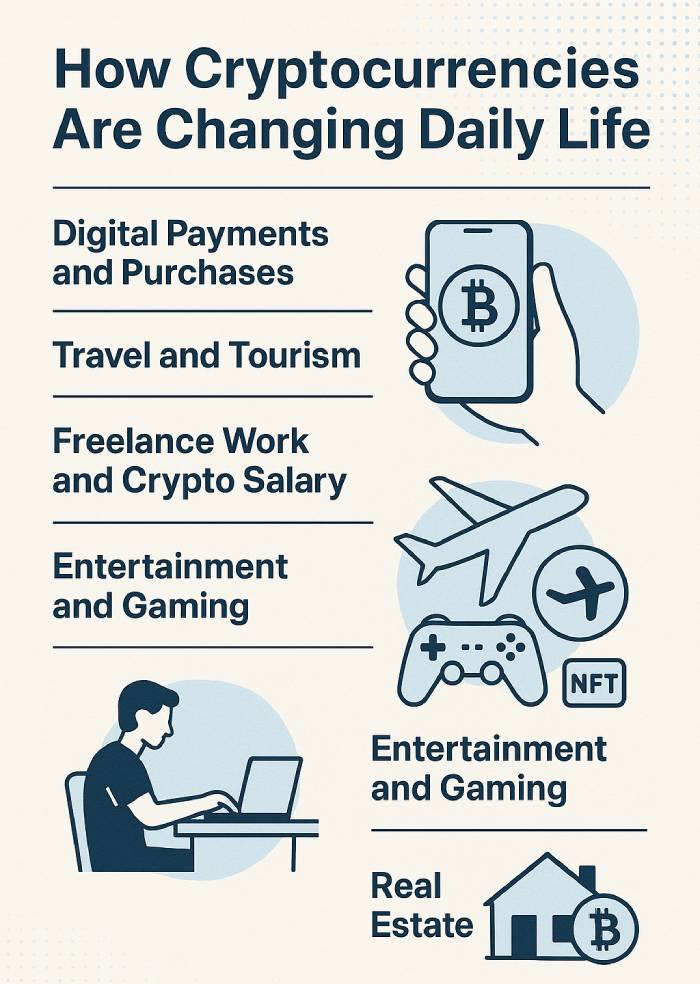How Cryptocurrencies Are Changing Everyday Life in 2026

Once seen as a niche tool for tech enthusiasts and bold investors, cryptocurrencies are now becoming a vital part of everyday life. Today, Bitcoin, Ethereum, and other digital assets are no longer just speculative investments—they are used for crypto payments, decentralized savings, and access to blockchain-based services. Let’s explore how digital currencies are being used in real-life situations and why global crypto adoption continues to grow.
Crypto Payments and Everyday Transactions
One of the most common uses of cryptocurrencies is in everyday digital payments. As of 2025, over 420 million people globally own cryptocurrency, and more than 15,000 merchants accept crypto payments. From large platforms like Microsoft and Shopify to local e-commerce websites, businesses are increasingly integrating crypto payment gateways.
Why choose crypto payments? Transactions are fast, secure, borderless, and do not rely on traditional banks. In countries like Nigeria, where over 35% of adults use digital currencies daily, crypto provides a solution for financial inclusion.
"The real breakthrough with crypto payments," explains Maria Sanchez, fintech analyst at GlobalData, "is that they remove friction for unbanked populations while maintaining a high level of transaction transparency."
User Experience:
Sandra, a small business owner in Brazil, accepts USDT payments via QR code. “With crypto, I get paid instantly without high banking fees,” she says. “Most of my international customers prefer it.”

Crypto in Travel and Tourism
The travel industry is also benefiting from cryptocurrency. Booking platforms like Travala and CheapAir report that nearly 10% of transactions are now made with crypto, including Bitcoin and stablecoins. Crypto eliminates exchange fees and simplifies payments for global travelers.
"Travelers are starting to see crypto not just as a novelty, but as a smart way to reduce costs," says James Lockhart, CEO of a blockchain travel service.
User Experience:
Mark, a digital nomad from Germany, uses Bitcoin to book flights and hotels. “Crypto gives me full control over my money while traveling,” he explains.
Crypto for Freelancers and Remote Work
In 2025, nearly 20% of freelancers choose to receive their salary in cryptocurrency. This trend is growing among remote workers who need fast, borderless, and low-fee transactions. Platforms like Deel and Remote OK now offer crypto payouts.
"Crypto empowers freelancers in places where the local currency may be volatile or where banking services are limited," says Clara Zhou, blockchain consultant.
User Experience:
Rajiv, a freelance developer in India, prefers USDC for client payments. “It’s faster than a wire transfer, and I don’t lose money to currency conversion.”
Crypto in Entertainment and Gaming
The blockchain gaming market is expected to hit $65 billion by the end of 2025. Gamers use cryptocurrency and NFTs to buy in-game assets, participate in play-to-earn models, and trade collectibles on decentralized platforms.
Crypto is also transforming online sports betting. More than 200 betting platforms now accept crypto, enabling secure, anonymous, and fast transactions.
"The transparency of blockchain gives users peace of mind," says Alan Becker, CTO at a major crypto betting platform.
User Experience:
Leo, a gamer from South Korea, earns and trades NFTs for ETH. “It’s a fun way to earn real value from what I enjoy doing.”
Crypto Real Estate Transactions
More real estate agents are accepting cryptocurrency for property purchases. In 2025, crypto real estate transactions are estimated to exceed $25 billion. Investors value the fast, borderless, and transparent process that blockchain offers.
Markets like Dubai, Miami, and Lisbon are popular for crypto-funded real estate investments. Blockchain cuts bureaucracy and provides verified ownership through smart contracts.
"What used to take weeks now takes hours," says Gabriella Ivanov, head of innovation at a European real estate firm.
User Experience:
Ahmed, a UAE investor, purchased a Lisbon condo with Bitcoin. “The entire deal was done on-chain—quick, clear, and with no hidden fees.”
The Future of Crypto Adoption
Cryptocurrencies are now a part of everyday life—beyond trading and investment. They support digital payments, enable global freelance work, power virtual economies, and simplify real estate transactions.
This change is driven by trust in blockchain technology, which ensures transparency, decentralization, and security. However, mainstream crypto adoption still faces challenges such as market volatility, regulatory uncertainty, and technical complexity.
"The next wave of adoption depends heavily on clearer regulatory frameworks and better user education," says David Kim, policy advisor at the Crypto Economic Forum.
As these challenges are addressed, cryptocurrencies will play an even bigger role in shaping the way we live, travel, work, and invest.
Conclusion
From daily purchases to international investments, cryptocurrencies are reshaping how we interact with money. The flexibility, speed, and transparency offered by blockchain-based solutions are no longer just attractive—they’re becoming essential. As real-world adoption continues to expand and technical and regulatory hurdles are overcome, the role of digital currencies will only grow stronger. The next decade won’t just see crypto in our wallets—it will see it embedded into the core of how the global economy functions.

